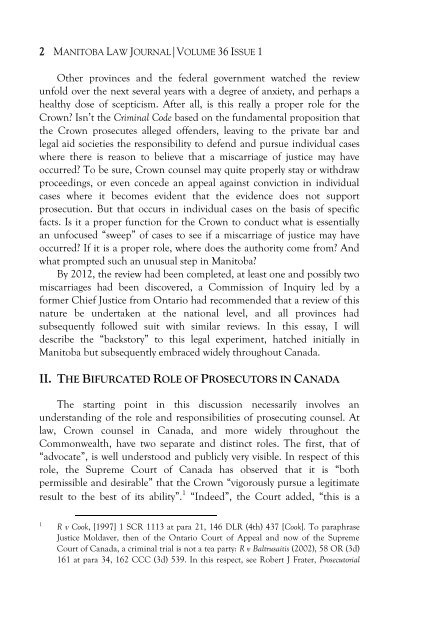Wrongful Convictions.pdf - Robson Hall Faculty of Law
Wrongful Convictions.pdf - Robson Hall Faculty of Law
Wrongful Convictions.pdf - Robson Hall Faculty of Law
Create successful ePaper yourself
Turn your PDF publications into a flip-book with our unique Google optimized e-Paper software.
2 MANITOBA LAW JOURNAL|VOLUME 36 ISSUE 1Other provinces and the federal government watched the reviewunfold over the next several years with a degree <strong>of</strong> anxiety, and perhaps ahealthy dose <strong>of</strong> scepticism. After all, is this really a proper role for theCrown? Isn’t the Criminal Code based on the fundamental proposition thatthe Crown prosecutes alleged <strong>of</strong>fenders, leaving to the private bar andlegal aid societies the responsibility to defend and pursue individual caseswhere there is reason to believe that a miscarriage <strong>of</strong> justice may haveoccurred? To be sure, Crown counsel may quite properly stay or withdrawproceedings, or even concede an appeal against conviction in individualcases where it becomes evident that the evidence does not supportprosecution. But that occurs in individual cases on the basis <strong>of</strong> specificfacts. Is it a proper function for the Crown to conduct what is essentiallyan unfocused “sweep” <strong>of</strong> cases to see if a miscarriage <strong>of</strong> justice may haveoccurred? If it is a proper role, where does the authority come from? Andwhat prompted such an unusual step in Manitoba?By 2012, the review had been completed, at least one and possibly twomiscarriages had been discovered, a Commission <strong>of</strong> Inquiry led by aformer Chief Justice from Ontario had recommended that a review <strong>of</strong> thisnature be undertaken at the national level, and all provinces hadsubsequently followed suit with similar reviews. In this essay, I willdescribe the “backstory” to this legal experiment, hatched initially inManitoba but subsequently embraced widely throughout Canada.II. THE BIFURCATED ROLE OF PROSECUTORS IN CANADAThe starting point in this discussion necessarily involves anunderstanding <strong>of</strong> the role and responsibilities <strong>of</strong> prosecuting counsel. Atlaw, Crown counsel in Canada, and more widely throughout theCommonwealth, have two separate and distinct roles. The first, that <strong>of</strong>“advocate”, is well understood and publicly very visible. In respect <strong>of</strong> thisrole, the Supreme Court <strong>of</strong> Canada has observed that it is “bothpermissible and desirable” that the Crown “vigorously pursue a legitimateresult to the best <strong>of</strong> its ability”. 1 “Indeed”, the Court added, “this is a1R v Cook, [1997] 1 SCR 1113 at para 21, 146 DLR (4th) 437 [Cook]. To paraphraseJustice Moldaver, then <strong>of</strong> the Ontario Court <strong>of</strong> Appeal and now <strong>of</strong> the SupremeCourt <strong>of</strong> Canada, a criminal trial is not a tea party: R v Baltrusaitis (2002), 58 OR (3d)161 at para 34, 162 CCC (3d) 539. In this respect, see Robert J Frater, Prosecutorial














